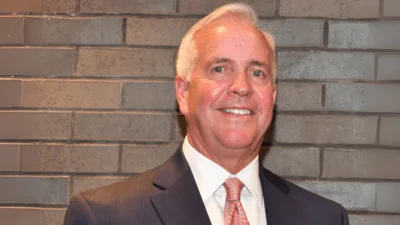Sen. Sue Rezin (R-Morris) recently made it clear that she is not in favor of water company monopolies.
HB4508, sponsored by Sen. James Clayborne (D-Belleville) and Rep. Nick Sauer (R-Lake Barrington), allows for a 10-year sunset for the expansion of privately owned water companies.
Rezin’s refusal of the bill was obvious at the May 9 Senate Executive Committee Hearing when she questioned Illinois American Water Director of Government Affairs Matt Glavin at length.

Sen. Sue Rezin (R-Morris)
It was just as obvious at the May 17 Senate floor debate.
“I stand in opposition to this bill,” Rezin said.
Rezin detailed the hard caps to infrastructure improvements put in place in the past; however, she said with HB4508 there is no price cap clause.
“With this bill, it is only for existing customers,” Rezin said.
It is not just the potential increase that concerns Rezin; it is the accounting method used to appraise the municipalities' water system. When the company comes in to purchase the water system, they are using the fair market value, which is the current value of an updated system, Rezin said.
“So if the infrastructure is updated, they would use the fair market value, which is a much, much higher rate that is passed onto ratepayers versus the depreciate accounting method, which gives the true cost of an old water system that has been depreciated,” Rezin said.
While the cities will receive substantially more for there systems, that cost is passed on directly to the new customers of the companies, she added.
To top it off, the Illinois Commerce Commission (ICC), which oversees rate increases, is not included in the bill and a majority of the expenses normally before the ICC are being passed onto the customer.
“It provides very little oversight,” Rezin said.
The bill was written for two private water companies, Illinois American Water and Aqua, to go into a community and purchase a water system at a very high cost to only be put on the back of taxpayers, she said.
If a municipality decides to cease a contract, they cannot, Rezin added.
“In 2007 ... one of the two companies that this bill was written for went before the ICC (and) asked and received for Pekin Illinois a 21 percent increase, for Champaign a 47 percent (increase), for Sterling a 20 percent (increase) and downstate towns a 14 percent increase,” Rezin said.
After citing more stats, Rezin said the bill is lacking hard cap restrictions and ICC oversight.
“Your ratepayers who receive these bills get sticker shock when they open up their bills,” Rezin said.
Sen. Chris Nybo (R-Elmhurst) used the example of selling a car or a house to prove his point. He said before doing so, you appraise the sale to ensure you receive fair market value. He said imagine if you could not do that, rather you had to have certain artificial adjustments interjected into the sale for depreciation.
“That penalizes municipalities who are seeking relief here,” Nybo said.
A lower value on the asset they are trying to sell defeats the whole purpose of the exchange.
“If we force them to artificially deflate the value of the asset, we are hurting the municipality and we are taking away the incentive for them to go out and sell,” Nybo said.
HB4508 passed 39-6 and moved out of the Senate.






 Alerts Sign-up
Alerts Sign-up